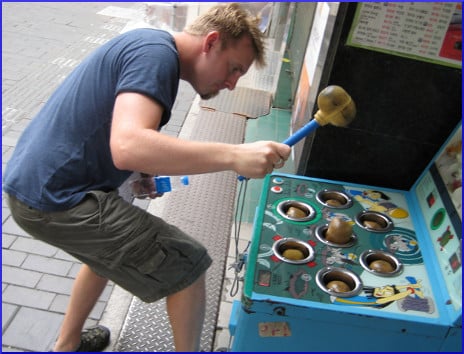Recently, Childhood Obesity News has considered how food addiction is not recognized by the Diagnostic and Statistical Manual of Mental Disorders (DSM-5), while similar maladies are granted official recognition. It seems as if the compilers of the manual reached strenuously to include some things, while ignoring the obvious parallels between compulsive overeating and other addictive disorders. Gambling, for instance, is uncomfortably shoehorned in alongside Substance-Related Disorders, even though it is not a substance.
Although food addiction has not been granted the DSM-5 imprimatur, many psychologists and physicians, including Dr. Pretlow, persist in treating it anyway. Washington Post reporter Jennifer LaRue Huget once interviewed psychoanalyst Marilyn Mertzl, who characterized addicts as people for whom “the source of all pleasure has become the source of all pain.” Dr. Mertzl went on to say:
Addiction to food operates on the same neurobiological highway as addiction to drugs, sex, gambling or alcohol…With food addicts, they eat all day, and they eat all night. The turnoff valve is broken…Usually by the time they come to me, they’ve tried a variety of unsuccessful interventions.
“Persistent desire or unsuccessful efforts to cut down or control opioid use” is one of DSM-5’s checklist items for diagnosing Substance Use Disorder. Heroin addicts and users of other substances have often, in the words of Dr. Mertzl, “tried a variety of unsuccessful interventions,” before they finally get straight. The same is true of food addicts, yet somehow that doesn’t count.
Alcoholism is also generally recognized as a disease. Comic Jamie Kilstein wrote a fascinating piece for Jezebel.com about how the realization that he was an alcoholic led to the conviction that his relationship to food was also addictive. These quotes are only fragmentary, for several reasons including explicit language:
You feel alone. You feel hungry. You feel like your problems aren’t real, so you don’t fix them. Then, you feel full… Then you hate yourself. Then you hate yourself for hating yourself. Then you eat. Then you feel sick….
Kilstein is an expert in fatlogic and also in persuasive psychology for a good cause – “You’re gonna give in to those giant corporations that profit on you hating yourself?”
It’s All the Same Mole
Dr. Vera Tarman very much wanted to see food addiction included, along with other substance abuse disorders, as a legitimate diagnosis in DSM-5. For RecoveryWire Magazine she wrote a piece with the unequivocal title, “Finally Sober, Suddenly Fat: Food Addiction is Another Drug Addiction.” Based on her observations of some 6,000 patients, Dr. Tarman finds that addiction follows what some call the “Whack-a-Mole” pattern – it may be suppressed in one area, but will pop up somewhere else. She writes:
A person would come into treatment to be treated for their alcoholism. They eat voracious amounts of food, usually to their horror, frequently gaining as much as 20 – 30 pounds in the three weeks of treatment… After treatment, this pattern of over eating and binge eating continues. It is as if they can not stop.
Patient histories reveal that many alcoholics were uncontrollable comfort eaters before developing a drinking problem, and when the alcoholism is treated, the comfort eating returns with full force. “The phenomenon of addiction does not favor one drug over another,” Dr. Tarman warns. Addiction is its own thing, and will happily glom onto whatever is available, including potato chips and sticky buns. She says:
Food can be a drug like any other, and can fuel the addictive cycle, which impedes recovery and sobriety… The answer to sobriety and serenity is in what you eat and especially, what you don’t eat.
Your responses and feedback are welcome!
Source: “Conquering Food Addiction,” WashingtonPost.com, 01/18/11
Source: “DSM-5 Substance Use Disorder,” buppractice.com, Undated
Source: “I’m an Alcoholic Dude With an Eating Disorder. Hi.,” Jezebel.com, 09/03/13
Source: “Finally Sober, Suddenly Fat: Food Addiction is Another Drug Addiction,” RecoveryWireMagazine.com, 05/02/13
Image by TPapi


 FAQs and Media Requests:
FAQs and Media Requests: 











